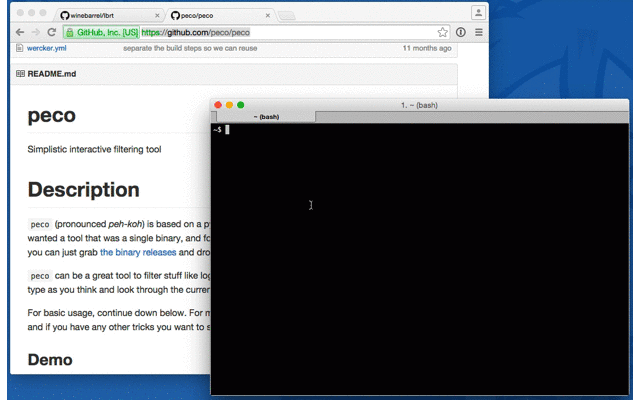
Security News
Astral Launches pyx: A Python-Native Package Registry
Astral unveils pyx, a Python-native package registry in beta, designed to speed installs, enhance security, and integrate deeply with uv.
A tool to manage Librato. It defines the state of Librato using DSL, and updates Librato according to DSL.
Add this line to your application's Gemfile:
gem 'lbrt'
And then execute:
$ bundle
Or install it yourself as:
$ gem install lbrt
$ lbrt
Commands:
lbrt alert SUBCOMMAND # Manage alerts
lbrt help [COMMAND] # Describe available commands or one specific command
lbrt metric SUBCOMMAND # Manage metrics
lbrt service SUBCOMMAND # Manage services
lbrt space SUBCOMMAND # Manage spaces
Options:
[--user=USER]
# Default: ENV['LIBRATO_USER']
[--token=TOKEN]
# Default: ENV['LIBRATO_TOKEN]
[--color], [--no-color]
# Default: true
[--debug], [--no-debug]
$ lbrt help alert
Commands:
lbrt alert apply FILE # Apply alerts
lbrt alert export [FILE] # Export alerts
lbrt alert help [COMMAND] # Describe subcommands or one specific subcommand
lbrt alert list # Show alerts
lbrt alert peco # Show alert by peco
Options:
[--target=TARGET]
$ brt help metric
Commands:
lbrt metric help [COMMAND] # Describe subcommands or one specific subcommand
lbrt metric list # Show metrics
lbrt metric peco REGRXP # Show metric by peco
Options:
[--target=TARGET]
$ lbrt help service
Commands:
lbrt service apply FILE # Apply services
lbrt service export [FILE] # Export services
lbrt service help [COMMAND] # Describe subcommands or one specific subcommand
lbrt service list # Show services
Options:
[--target=TARGET]
$ lbrt help space
Commands:
lbrt space apply FILE # Apply spaces
lbrt space export [FILE] # Export spaces
lbrt space help [COMMAND] # Describe subcommands or one specific subcommand
lbrt space list # Show spaces
lbrt space peco # Show space by peco
Options:
[--target=TARGET]
[--concurrency=N]
# Default: 32
$ lbrt space export space.rb
$ cat space.rb
space "My Space" do
chart "My Chart" do
type "line"
stream do
metric "login-delay"
type "gauge"
...
$ lbrt space apply space.rb --dry-run
$ lbrt space apply space.rb
service "mail", "my email" do
settings "addresses"=>"sugawara@example.com"
end
service "slack", "my slack" do
settings "url"=>"https://hooks.slack.com/services/..."
end
alert "alert1" do
description "My Alert1"
attributes "runbook_url"=>"http://example.com"
active true
rearm_seconds 600
rearm_per_signal false
condition do
type "below"
metric_name "login-delay"
source "foo.bar.com"
threshold 1.0
summary_function "sum"
end
service "mail", "my email"
end
alert "alert2" do
description "My Alert2"
active true
rearm_seconds 600
rearm_per_signal true
condition do
type "absent"
metric_name "login-delay2"
source nil
duration 600
end
service "slack", "my slack"
end
space "My Space1" do
chart "chart1" do
type "stacked"
stream do
metric "login-delay"
type "gauge"
source "*"
group_function "average"
summary_function "average"
end
end
end
space "My Space2" do
chart "chart1" do
type "line"
stream do
metric "login-delay"
type "gauge"
source "*"
group_function "breakout"
summary_function "average"
end
end
chart "chart2" do
type "line"
stream do
metric "login-delay2"
type "gauge"
source "*"
group_function "breakout"
summary_function "average"
end
end
end
template "dstat" do
chart "total_cpu_usage" do
type "stacked"
stream do
metric "dstat.#{context.space_name}.total_cpu_usage"
type "gauge"
source "*"
group_function "breakout"
summary_function "average"
end
max 100.0
end
chart "load_avg" do
type "line"
stream do
metric "dstat.#{context.space_name}.load_avg"
type "gauge"
source "*"
group_function "breakout"
summary_function "average"
end
end
end
space "my-host-001" do
include_template "dstat"
end
You can use the template in the alert and service.
template "my alert" do
alert context.metric_name do
description "desc"
attributes "runbook_url"=>"http://url.com"
active true
rearm_seconds 600
rearm_per_signal false
condition do
type "below"
metric_name context.metric_name
source nil
threshold 4.0
summary_function "sum"
end
service "mail", "my email"
end
end
include_template "my alert", metric_name: 'login-delay'
include_template "my alert", metric_name: 'login-delay2'
template "alert set1" do
alert "#{context.hostname}/login-delay" do
description "desc"
attributes "runbook_url"=>"http://example.com"
active true
rearm_seconds 600
rearm_per_signal false
condition do
type "below"
metric_name 'login-delay'
source nil
threshold 4.0
summary_function "sum"
end
service "mail", "my email"
end
alert "#{context.hostname}/login-delay2" do
description "desc"
attributes "runbook_url"=>"http://example.com"
active true
rearm_seconds 600
rearm_per_signal false
condition do
type "below"
metric_name 'login-delay2'
source nil
threshold 4.0
summary_function "sum"
end
service "mail", "my email"
end
end
include_template "alert set1", hostname: 'host1'
include_template "alert set1", hostname: 'host2'
lbrt alert peco
lbrt metric peco
lbrt space peco

FAQs
Unknown package
We found that lbrt demonstrated a not healthy version release cadence and project activity because the last version was released a year ago. It has 1 open source maintainer collaborating on the project.
Did you know?

Socket for GitHub automatically highlights issues in each pull request and monitors the health of all your open source dependencies. Discover the contents of your packages and block harmful activity before you install or update your dependencies.

Security News
Astral unveils pyx, a Python-native package registry in beta, designed to speed installs, enhance security, and integrate deeply with uv.

Security News
The Latio podcast explores how static and runtime reachability help teams prioritize exploitable vulnerabilities and streamline AppSec workflows.

Security News
The latest Opengrep releases add Apex scanning, precision rule tuning, and performance gains for open source static code analysis.